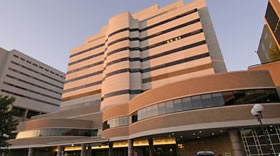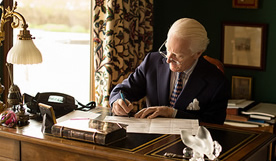A Quarter Century of Care

Research, cures and better living with cancer
When the U-M Rogel Cancer Center received its formal designation from the National Cancer Institute in fall 1988, cancer affected more than 1.3 million people in the United States annually. Director Max Wicha, M.D., stressed the importance of taking research developments from the labs and applying them to patient care in the clinics.
Twenty-five years later, the number of annual cases has risen to 1.6 million, but advances in cancer treatment have led to better outcomes, more cures and more people living quality lives with cancer: there are 14 million survivors in this country. Some cancers with very low survival rates can now be treated and cured in many cases. Clinical trials and new therapies can be used as stepping stones, forging a path toward a longer life and potential cures in the future. Here are the stories of two cancer center patients with very different journeys.
The science and art of cancer treatment, as told by two long-term patients
Cured in the nick of time

Photo by Edda Pacifico
Even though Betsy de Parry, 62, jokes about the state of Michigan being "geographically undesirable" compared to her previous home of West Palm Beach, Fla., she wouldn't move back because of the security she feels living near the Rogel Cancer Center since her diagnosis in 2002.
"I will never forget the day I walked into that cancer center, sat in the waiting room wondering what we were doing there and walked out as a very scared cancer patient," de Parry says. "Today I walk into the cancer center and it's a place of healing and comfort. I know that if I ever got cancer again, everyone there would treat my future as if it were their own."
When de Parry was diagnosed with non-Hodgkin's lymphoma, treatment options were not what they are today. Starting with a clinical trial, her cancer simply did not respond to the chemotherapy she received.
"There were times my mind went to that dark place," de Parry says. "My husband and I always believed I would beat this. At least we tried to say we believed it, but I remember one time walking into my closet to get dressed, wondering what to wear and collapsing in a pool of tears. I wasn't ready for my life to end."
-- Mark S. Kaminski, M.D.
A new therapy, radioimmunotherapy, became available just in the nick of time and de Parry's oncologist, Mark S. Kaminski, M.D., who discovered and developed the therapy, encouraged her to pursue it. She took two doses a week apart and was cured. Her cancer has never relapsed.
"Cutting-edge research saved me and Michigan is at the forefront," she says. "I'm in awe of the people willing to spend hours in a lab, day after day, year after year, to save people like me. I’ll never be able to thank them all."
Today de Parry has been cancer-free for 11 years and still works side by side with her husband and best friend, Alex, at Ann Arbor Builders. A byproduct of her cancer, she says, was being able to put context to compassion.
"Doctors can never make guarantees and I know that," she says. "But Dr. Kaminski and (nurse practitioner) Judy Estes always kept my hope alive. Somehow they found a way to rekindle that hope when they saw it starting to go out. It would have been a much more difficult time emotionally had they not been there for me."
Medicine as an art form

Photo by Edda Pacifico
Tom Shumaker, an attorney from Grosse Pointe, was just 47 when diagnosed with kidney cancer in 1995 by his father Edward, the former chair of urology at Harper Hospital. When the referred surgeon wasn’t immediately available, Shumaker became even more anxious.
"Growing up in a surgeon's home, my father's philosophy was if you have cancer and you can operate, cut it out," he says.
Shumaker's brother knew their high school buddy, James S. Montie, M.D., had recently been selected to lead urology at U-M. Montie scheduled Shumaker for surgery and within days removed his left kidney along with numerous affected lymph nodes.
For the past 18 years, Shumaker has enjoyed periods when his cancer remained dormant and periods of recurrence that led to additional surgeries and treatments. Bruce G. Redman, D.O., joined his treatment team in 2005 and oversaw an aggressive form of immunotherapy and a drug regimen that interferes with the growth of his cancer cells.
-- James Montie, M.D.
"I'm fortunate to have developed relationships with people rather than an institution," Shumaker says. "The pure people in medicine, like Dr. Montie, Dr. Redman, their immediate staff and others, know it’s not just a science. There is still an art in taking care of patients."
Shumaker has managed metastatic renal cell cancer for close to four years on a drug regimen. He's watched his two sons grow into adults, he became a grandfather and he enjoys life with his "bride of almost 37 years." At 65, he works in property management and is an avid player of sports involving the modern-day racquet and old-fashioned racket.
"I love life," Shumaker says. "That's why I've lived with cancer. Every day is a gift. It's not to say there aren't peaks and valleys, but there are all kinds of goodness in the world."
Read the Summer, 2013 issue of Thrive.
Learn more about the history of cancer and how you can help
Find out how to join a clinical trial that could help you become the future of cancer treatment.
Check out the American Cancer Society’s History of Cancer.
